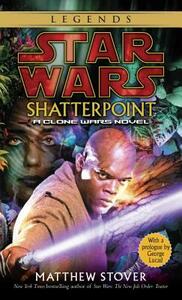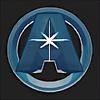You need to sign in or sign up before continuing.
Take a photo of a barcode or cover
adventurous
dark
hopeful
reflective
sad
tense
slow-paced
Plot or Character Driven:
A mix
Strong character development:
Yes
Loveable characters:
Yes
Diverse cast of characters:
Yes
Flaws of characters a main focus:
No
Shatterpoint is one of the few Legends Star Wars novels released in TP format as part of the expanding Essential Star Wars collection - some of the best and most impactful and loved novels of the Expanded Universe (EU) in the Star Wars universe of books. "Shatterpoint" is told from the POV of Mace Windu in both third person and first person through his journals.
In this story, we find Jedi Master Mace Windu after the battle of Geonosis, uncomfortable with the outcome of the battle. He is called to the Supreme Chancellors office because of an issue that has arisen on Haruun Kal, his former homeworld, and because of his former Padawan, Depa Bilaba and her role in some of the chaos unfolding on the planet.
The book is a roller coaster of events, with Master Windu and the reader barely having any time to gather themselves and rest as events follow one after another on the planet. It is also very dark for a Star Wars novel, and does not shy away from some darker actions and topics in the book.
One of my issues with the book came with how Master Windu, Haruun Kal, and the motivations of how the characters interacted occurred. Perhaps minor, but the fact that Master Windu was from a jungle planet where there was a genocide and people living in the jungle did not sit right with me initially. I also did like the characterizations of many of the Koruan (culture that Windu belonged to on the planet) as the author put for the narrative. However, it did not fully take away from the enjoyment of the novel and glad that I was able to finally read the story.
In this story, we find Jedi Master Mace Windu after the battle of Geonosis, uncomfortable with the outcome of the battle. He is called to the Supreme Chancellors office because of an issue that has arisen on Haruun Kal, his former homeworld, and because of his former Padawan, Depa Bilaba and her role in some of the chaos unfolding on the planet.
The book is a roller coaster of events, with Master Windu and the reader barely having any time to gather themselves and rest as events follow one after another on the planet. It is also very dark for a Star Wars novel, and does not shy away from some darker actions and topics in the book.
One of my issues with the book came with how Master Windu, Haruun Kal, and the motivations of how the characters interacted occurred. Perhaps minor, but the fact that Master Windu was from a jungle planet where there was a genocide and people living in the jungle did not sit right with me initially. I also did like the characterizations of many of the Koruan (culture that Windu belonged to on the planet) as the author put for the narrative. However, it did not fully take away from the enjoyment of the novel and glad that I was able to finally read the story.
adventurous
dark
slow-paced
It feels like it took an eternity to get through this one. I got very confused in the story and honestly I’m still a bit lost. I guess it’s just not what I expected.
I still love Mace Windu, but this story didn’t really add much to my perception of him.
I still love Mace Windu, but this story didn’t really add much to my perception of him.
adventurous
dark
mysterious
tense
fast-paced
Plot or Character Driven:
Plot
Strong character development:
No
Loveable characters:
Yes
Diverse cast of characters:
No
Flaws of characters a main focus:
No
adventurous
dark
tense
Graphic: Animal death, Death, Gore, Torture, Violence, Blood, Murder, War, Injury/Injury detail
Moderate: Drug use, Xenophobia, Colonisation
Minor: Genocide, Sexual violence
The characterization was great and it was over all a good read, but I wasn't a big fan on how the colonialism stuff was handled.
It does make episode 3 more tragic, like several other people have already said. And it does give Mace as an character some well-needed and deserved depth.
(These weird star wars fans on tumblr should read this if they had any reading comprehension. They do not).
The ambulance line is my favorite line, I have to add.
It does make episode 3 more tragic, like several other people have already said. And it does give Mace as an character some well-needed and deserved depth.
(These weird star wars fans on tumblr should read this if they had any reading comprehension. They do not).
The ambulance line is my favorite line, I have to add.
Thank the Force for Shatterpoint. I remember enjoying this one back when it came out, but now I find myself appreciating it even more because of its context.
Now that the Expanded Universe is defined by finite parameters, I’ve been doing a grand re-read, chronologically, through the entire thing. The vast majority of these books I have read before, but there are a handful which I missed when they released – mainly from the final few years of EU publishing, partly because I was just too busy at that time in my life, and partly because the last years of EU publishing began to offer material that felt rushed, churned out, short at 250 pages and somehow still padded with filler and thinly sketched. I’m in the Clone Wars era right now, and honestly, I’ve been disappointed by these books that I missed first time round. Perhaps it has something to do with the fact that they are novelisations of stories told in a very different format originally, I’m not completely sure yet. I was even let down by The Cestus Deception, which I did read on release and I remembered liking, but today just seems okay and basically missable. I kind of have a goal, as well as doing a marathon re-read, of creating a personal cut of Expanded Universe canon, and so far I hadn’t liked a single entry from the Clone Wars era well enough to include it. Shatterpoint just made my list.
There are surface reasons why someone might be drawn in to this book, and then there are the deeper reasons why it is actually good. One of the surface reasons is that Mace Windu and his former Padawan, and fellow Council member, Depa Billaba, are the stars of the show. Exploring some of the universe’s intriguing side characters and fleshing them out, giving the impression of a rich and exciting galaxy aside from what we think of as our core main characters is definitely a plus point… but only if the story then written is worthwhile. If the story turns out to be a poorly written mess, we feel cheated out of what we were promised and tend to reject the portrayal of these characters. The Cestus Deception is, in my opinion, an example of a book that copped out of this promise, dangling Kit Fisto and then making him share the limelight with Obi-Wan and an original clone character, and never letting us get inside his head even though we spend plenty of time with Obi-Wan’s inner monologue. Not so here. Mace Windu is front and centre, and Obi-Wan and Anakin are nowhere in sight. This is a good thing for this book, as it means there are no distractions from putting the focus where it should be.
Stover has something of a reputation in the Expanded Universe for delivering complex, brutal stories, and Shatterpoint is no different. Stover often strives to show the harsh realities of war, the way it blurs lines and snatches away clear-cut choices between good and evil. There are still heroics here, but not of the rollicking adventure kind, and they are all the more poignant for the sheer struggle it takes to achieve them, to do something as simple as save a single life. I frequently enjoy this kind of writing because the echoes of realism lend the story a stamp of authenticity that aids believability, and also because we become more invested in the story if the risk and consequences are treated seriously. Some people may be thinking this is out of step with the fun adventure time story that is Star Wars, but I would remind people that the original film saw Owen and Beru callously murdered, the captain of the Tantive IV interrogated, killed, and discarded, Leia tortured, and genocide committed against an entire planet. Sure, at the end our heroes returned in time for tea and medals, but you cared about these characters because you took the threats they faced very seriously indeed. We are clearly shown the impact of war and how pitiless people can be. Shatterpoint is not out of step with this – it continues its tradition. In any case, be warned that this story can get pretty grim and dark – but if you ask me, I consider that a positive. The book explores meaningful situations, like what happens when two groups in conflict get so caught up in a cycle of vengeance that they dehumanise one another, and their children grow up indoctrinated in hatred and prejudice. These are tough themes, but they are themes that need to be explored.
With 410 pages to play with (plus ten at the end devoted to an extra short story), Stover has plenty of time and space for his subject, and this book feels substantial and significant compared to the paltry 250-page offerings aforementioned. Somehow, he succeeds in placing his main characters in considerable danger, and evoking reader worry for them, and yet also depicting moments of giddy, glorious triumph where their strength of will and Jedi training positively shines through. Stover manages to walk the knife edge of tension masterfully, never letting us get too depressed about a defeat without some satisfying success bolster our spirits, and never letting victories come too easily, without a sudden reversal or three. The successes, when they come, feel deeply satisfying because of the struggles we have to go through to get there. Stover also makes us care about the side characters, even though they are brand new and original to this story, and at the start they come across as rather unlikeable. Shared hardship reveals hidden depths and strips away masks. These people feel realistic; defensive but essentially decent and afraid. I’m not just talking about Nick and Chalk, but Geptun as well. So many low-level functionaries on the opposing side in Star Wars are depicted as incompetent pen pushers – mainly Imperial, but pre-Empire this translates to the financiers of the Separatist movement. Geptun is anything but. He’s a smart man, though not infallible, and like Nick and Chalk is essentially decent. His efforts pose a deadly threat to Mace and he is credible as a dangerous adversary. He is also treated as a fellow human being, to the point where
Spoiler
an impressed Mace recruits him to Republic Intelligence in the aftermath.Spoiler
Depa’s fall is bittersweet because it comes from a place of loyalty to the vulnerable people she is protecting – but she buys into the indoctrination of hate, of “us vs them”.I’ve been trying to think of criticisms, and I suppose the most significant one is that things can get a bit confusing in this book. The final quarter of the book, which encompasses the ultimate confrontation and climax of the story, has so many betrayals and sudden reversals in it that it can get a little bit punch drunk at times. The overall lesson that Mace learns, or that the story is trying to impart, feels a bit murky too. I’m not sure if this is a legitimate criticism though, since Mace himself is intended to spend most of the book thrown into ethical turmoil and unsure of his path and his principles. Some final thoughts come through loud and clear – the importance of seeing the ‘humanity’ in others no matter what side they’re on. The importance of standing up for what is right and fighting even if you can’t win. Other questions remain obscure. Is the book saying that civilisation is good and the natural jungle is savage and bad? Is it saying that the Jedi should not be taking a partisan stance fighting for the Republic and should instead be moving among both sides, simply wherever they are needed to protect people? I’m really not sure. Perhaps the book deliberately leaves these questions open for readers to ponder.
9 out of 10
adventurous
challenging
dark
tense
medium-paced
Plot or Character Driven:
A mix
Strong character development:
Yes
Loveable characters:
Complicated
Diverse cast of characters:
Yes
Flaws of characters a main focus:
Yes
adventurous
dark
emotional
hopeful
lighthearted
mysterious
medium-paced
Plot or Character Driven:
Plot
Strong character development:
Complicated
Loveable characters:
Yes
Diverse cast of characters:
No
Flaws of characters a main focus:
N/A





